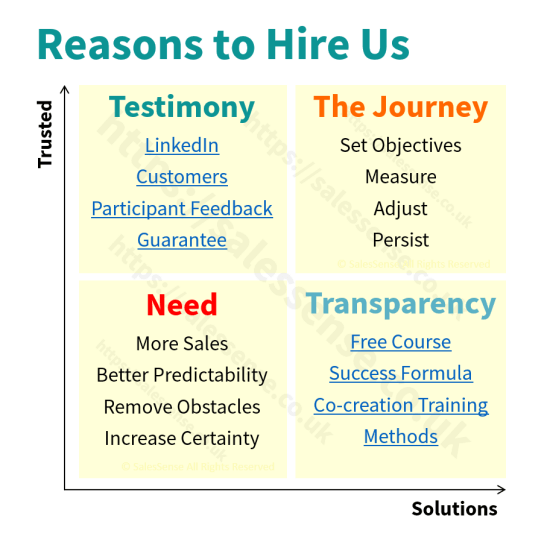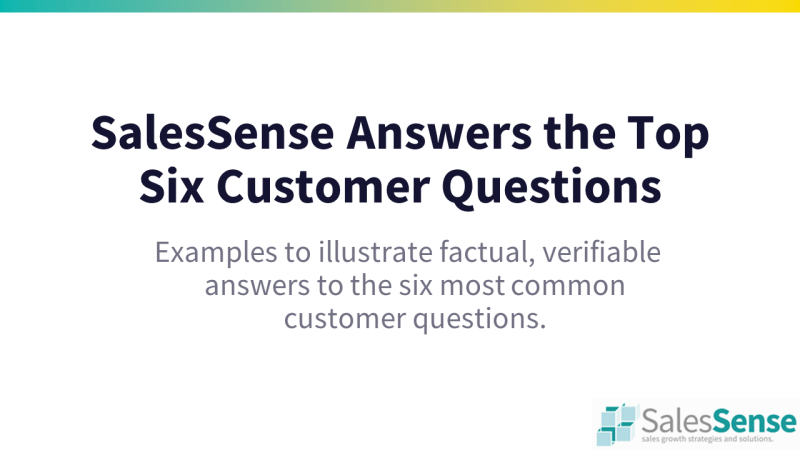Learn to sell and change things for the better.

Do you need to increase sales results or develop sales capability? Take a shortcut. Schedule a call and ask me anything. I'll share what I know. Learn to sell more effectively. Reach out today for a "How to learn sales" special offer.
How can I learn to sell?
To be a great salesperson, you don't have to persuade people to buy things they don't want. Instead, help them do what they want to do. Just help people exceed their expectations. Learn to sell and change the world.
Salespeople are change agents. Enable yourself or your team to change the world.
Follow These Eight Steps to Learn Sales or Teach Others
Learning to sell involves acquiring sales knowledge, mastering a mix of skills and practicing a range of methods. Here’s a step-by-step guide:
1. Understand the Fundamentals of Selling
Learn Sales Basics: Research core sales concepts like prospecting, qualifying leads, pitching, overcoming objections, closing, and follow-up. You can find free help for all of these topics on this site. Use the search box at the top of the right-hand column or explore our free resources.
Develop sales product knowledge: Learn what you're selling inside and out. Understand its features, benefits, and how it solves problems. The better you know the products and services you sell, the easier it will be to help those with a need, appreciate the value. Learn what you sell to learn how to sell.
Understand Your Market: Learn about your target audience, their strengths and weaknesses. The macro and micro trends affecting their business. Who competes with whom? The relative market shares of those in the market. their needs, pain points, and preferences. Learn how to be a consultant to your customers to learn how to sell.
Try our free sales knowledge assessment.
2. Develop Key Skills

Communication: Practice clear and persuasive communication. Tailor your message to your audience. Develop convincing answers to the top six customer questions. Learn to sell by using facts that lead people to think what you want them to think.
Attentive Listening: Listen to customers’ needs and concerns to provide tailored solutions. Telling is not selling. Instead of pitching, ask questions that expand the other person's thinking. "A mind that expands to accommodate a new idea never returns to its original state." Edward De Bono.
Empathy: Understand and connect with your customers’ emotions and perspectives. Aristotle said that persuasion rests on three things. First and most important, the connection with the emotional need for action. Second, the credibility of the information source, and third, the logic of the argument.
Negotiation: Learn how to sell win-win solutions. It is tempting to take advantage of weaknesses in the other party's negotiation position or skills yet in business, repeat business is essential. Top negotiators preserve both their win and the customer's win.
Resilience: Develop the ability to handle rejection without discouragement. It will often seem as if a 'no' is a personal insult, a denigration of your status as a human being. Yet you know this will rarely if ever be the case. Prospects will reject your proposition. Instead of feeling hurt, make your proposition stronger.
Learn how to help people do what they want to do to learn how to sell.
3. Learn and Practice Sales Techniques
Consultative Selling: Focus on building relationships and solving customer problems rather than pushing products. Obey the three rules: Make no assumptions; declare your intent to make no assumptions; and don't talk about the solution. Follow our sales discovery process, CLEAR: Circumstances; Leverage; Expand; Advantage and last, the Requirement. Learn to sell by reading more about the three rules and CLEAR in this article.
Ask good questions: Ask about a prospect's situation and circumstances, encourage sharing of issues, obstacles, and problems. Ask questions to connect their concerns with things you can help with. Invite them to express the benefits of a solution and articulate a need you can fulfil. Asking better questions is a fundamental aspect of learning to sell.
Storytelling: Prepare compelling stories that demonstrate value and build emotional connections with the need for action. There are four types of sales stories that are essential: Your story; the company story; customer stories, and trust stories. This article discusses sales story variations that sell.
Social Selling: Combine the use of platforms like LinkedIn and online research to find people with an immediate need for what you are selling. Then seek to build a relationship and trust. Lead the conversation instead of pitching. Telling is not selling. Develop the ability to persuade without telling to learn how to sell.
4. Educate Yourself
"If you think education is expensive, try ignorance." Derek Bok
Ask salespeople for their book recommendations:
- How to Win Friends and Influence People by Dale Carnegie
- Let's get Real or Let's not Play by Mahan Khalsa
- Selling the Wheel by Jeff Cox and Howard Stevens
- Get Anyone to Do Anything by David J. Lieberman
Explore our courses:
- Free B2B Self-Led Sales Training
- Sales Training Course Index
- Attend workshops or seminars in your industry.
Mentorship: Learn to sell from experienced salespeople who can share practical insights and advice.
Get a coach: Salespeople with a coach sell 13% more than those without, on average.
5. Practice in Real-Life Scenarios

Start Small: Practice selling to friends, family, or small audiences. Sell them on their own ideas! It is much harder than you might think. People don't act on their ideas for many reasons including procrastination; lack of motivation; having no support; having no money, and fear of failure. "Fail forward faster," wrote Tom Peters.
Role-Playing: Simulate sales scenarios to gain confidence and refine your pitch. Have peers, teammates, friends, and even family members play the part of a prospective customer. Brief them with some real or imaginary details. Then try to sell them. It may be a horrible experience. Having a bad time attempting something is the fastest way to learn.
Get a Sales Job: Consider starting in an entry-level sales position to gain experience. Apply for part-time sales roles. Sell yourself into a job. Alternatively, find a product or service that you can be passionate about and seek a commission-only or affiliate role. Make selling an imperative to learn to sell.
If you want to learn how to sell, immerse yourself in selling.
6. Use Technology to Your Advantage
Organisation: Learn to use customer relationship management tools like Salesforce, HubSpot, or Zoho to organise and track leads. Track your key performance indicators (KPIs) such as average sales value, the number of contact events you achieve, and contact-to-sale conversion rates. Leverage the data to understand trends, measure success, and refine strategies.
Learn how to use digital marketing techniques to automate email lead generation. It can be done for less than £100 a month. We explain how in our Digital Marketing course.
7. Build Self-Confidence
Confidence comes from the certainty of knowing what one is doing, from the support of others who have succeeded, and from self-respect. Take the actions described above to acquire robust self-confidence.
Set Goals: Define specific, measurable sales goals to track your progress. Break up big goals into smaller objectives. If it is scary, break it up. If you are plagued with perfectionism, break up objectives into easy steps. "A journey of a thousand miles begins beneath one's feet. Lao Tzu
Seek Feedback: Regularly ask for constructive feedback from peers, mentors, or managers. Asking for feedback takes courage. You have to make yourself vulnerable and steel yourself against defensive reactions. Managers, peers, teammates and even friends shy away from saying what they really think. So first, give them a free pass. Indemnify them for any hurt they may cause you. Explain that their true opinions are more valuable to you than your pride.
Celebrate Wins: Recognise and reward your successes, no matter how small. Make a list of guilty pleasures. Things that you don't normally allow yourself. Maybe not sugar-based treats. Fine things that motivate you and gift them to yourself when you reach milestones or achieve objectives.
Learn to sell by managing yourself first. "Those who know others are wise. Those who know themselves are enlightened." A slightly adapted version of words by Lao Tzu.
8. Stay Persistent and Consistent
Continuous Improvement: Reflect on your sales interactions, identify what worked and build on it. It is much more productive to work on things we do well. Improve what didn’t. Fix things that might cause others to think you won't succeed.
Learn from Rejections: Understand that rejection is part of the process and use it to grow. I often quote Tom Peters who wrote, "Fail forward faster". If you want more success in your life you have to tolerate more failure.
Network: Build connections with peers, customers, and industry leaders to learn from their experiences. Prepare a set of questions for drawing out relevant opinions. Memorise your questions so that you can seek opinions whenever you meet people. People love to be asked what they think.
Learn to Sell with Others
It is a lonely road to travel by one's self. Travel in a group for support. Find others with the same or similar aims and meet regularly to compare notes and share insights.
Would you like help building a personalised learning plan or tackling specific challenges, such as prospecting, demonstrating, negotiating, or closing? Would you like help developing a team of top sales performers? Schedule an informal conversation with Clive Miller here.
How does selling change the world?
Selling people on their own ideas seems unnecessary yet it is at the heart of making the world a better place.
How many from any group of ten people are doing what they want to do?
Ask the following question of anyone to find out:
"If you didn't have to work, if you didn't need a job, would you still be doing what you are doing now?"
What do you think the answer would be?
How many people would say, 'yes'?
1 in 10? 2 in 10? 3 in 10 perhaps?
Everything has to be sold.
We often need persuading to do what we want to do.
People change the world by selling.
Telling is not selling. Offering an alternative is not selling. Salespeople need to change the world so that customers benefit from what they sell.
If you know of something that will benefit people or organisations and fail to convince them to act, you are letting them down. Learn to sell and change things for the better.
Entrepreneurs need to change the world for investors so they will fund their ideas. Without funding or volunteers, little can be done.
Business leaders need to change the world for stakeholders, employees, business partners, and customers. A business that fails to deliver value doesn't last long.
Parents need to change the world to nurture their children because they are the future. Without continuous new cohorts of smart, well-grounded, and virtuous adults, we are all doomed.
The greatest idea will do no good if it isn't successfully sold to others.
If you need to change the world, learn to sell like those who change the world.
Most high-profile world changers started from humble beginnings.
There are tens of thousands of people who have made a difference. Their lives, ideas and accomplishments are easy to study.
"The most difficult thing is the decision to act, the rest is merely tenacity. The fears are paper tigers. You can do anything you decide to do. You can act to change and control your life; and the procedure, the process, is its own reward." - Amelia Earhart
Learn to sell and change the world with assessments.
Test yourself, team members, teams, plans, or organisation with our free (no sign-up) assessments;
- SDR - BDR - Telesales
- Professional Sales Skills and Habits
- Sales Knowledge Assessment
- Sales Win Predictor
- Sales Management and Leadership
- Sales Motivation
- Sales Organisation and Operation
- Marketing Plan Assessment
- Sales and Marketing Alignment Assessment
- Sales Enablement Assessment
- Test Any Plan
- Presentation and Public Speaking Skills
- Sales Trainer Skills
More Help for Learning to Sell
Are you getting the 25% sales enablement upside?
Are you getting the 13% coaching and training upside?
- What do you know and do now?
- What needs improving?
- What don't you know?
- Take this free quiz and find out. No sign-up. See the results on the page in real time.
Should you hire a professional?
Test a plan to find out. No sign-up. Score ten statements for the result.
Are Your Sales and Marketing Processes Optimised?
Are you selling as much as you need to or think you should?
Use our free assessments to diagnose the issues. Follow our guide.
Or have us carry out a comprehensive sales and marketing audit.
Proof that Training and Coaching Increase Business Results
Explore the research we have conducted here.
In this video Co-Owner of SlipTest, Belinda Bleakley, tells the story of their decision to invest in sales training and coaching to support post-COVID recovery and how it has helped them bounce back, stronger than ever.
Harry Beacall shares the impact coaching has had on his sales results here.
Case studies, endorsements, and feedback here.
Do you need help to change the world?
Schedule an informal conversation with Clive Miller or call +44 1392 851500.
If you need to change the world or learn to sell a world-changing idea, we can help. Schedule a sales consultation or call +44 (0)1392 851500. Alternatively, use the contact form here or send an email to jimm@salessense.co.uk.


























